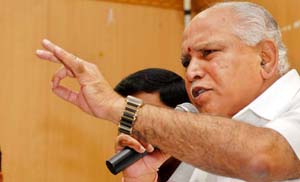Bengaluru, Jul 3: BJP state president B S Yeddyurappa on Sunday said the Congress leaders are issuing irresponsible statements on his Dalit outreach programme as they are unable to digest its success.
Speaking after inducting former minister S N Krishnaiah Setty into the party fold, he claimed that the recently concluded Janasamparka Abhiyana (Dalit outreach programme) was a grand success. The party received overwhelming response from people. The Congress leaders are finding it difficult to accept the fact that Dalits are swaying towards the BJP and hence, they are issuing irresponsible statements, he charged.
The state Congress had accused Yeddyurappa of having hotel-made food at a Dalit’s house during Janasamparka Abhiyana in Chitradurga district. Chief Minister Siddaramaiah had even charged him with practicing untouchability for not eating food cooked by Dalits.
Yeddyurappa said many leaders in the Congress are upset with the misrule of the state government. They are all eager to join the BJP. The BJP workers should focus on strengthening the party. The target is to win 150 seats in the next Assembly elections. The party has recently launched Vistaarak programme in order to strengthen the party at the booth level, he added.
Setty said he did a mistake by quitting the party and assured the BJP leaders that he will strive to strengthen the party in Kolar district. Setty was a BJP MLA from Malur Assembly constituency in Kolar district. He was minister for Muzrai and Housing in the BJP government headed by Yeddyurappa. He was dropped from the Cabinet following a controversy related to land acquisition by the Karnataka Housing Board.
Setty had rebelled against the BJP in 2013 as the party denied him the ticket to contest the Assembly polls from Malur. He unsuccessfully contested as an Independent candidate. Later, he joined the Congress in 2014.
Besides, the state BJP appointed K P Nanjundi as the party vice-president. Nanjundi, a businessman and leader of the Vishwakarma community, recently joined the BJP after quitting the Congress.





Comments
D.K. Police kindly inform us how these people gathered at BC Road while IPC 144 Section imposed. Why double standard maintained by CongRSS and State Police.
Add new comment